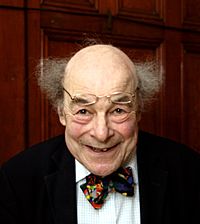Heinz Wolff facts for kids
Quick facts for kids
Heinz Wolff
|
|
|---|---|

Professor Heinz Wolff in 2010
|
|
| Born |
Heinz Siegfried Wolff
29 April 1928 |
| Died | 15 December 2017 (aged 89) |
| Citizenship | British |
| Alma mater | University College London |
| Scientific career | |
| Fields | Bioengineering |
| Institutions | Brunel University |
Heinz Siegfried Wolff (born April 29, 1928 – died December 15, 2017) was a famous British scientist. He was born in Germany. Many people knew him from his TV and radio shows. He was especially famous for the BBC television series The Great Egg Race.
Contents
Early Life and Moving to Britain
Heinz Wolff was born in Berlin, Germany. His father, Oswald Wolff, was a publisher. His mother, Margot Wolff, sadly passed away in 1938.
In August 1939, Heinz and his father had to leave Germany. They were Jewish refugees and moved to the Netherlands. On September 3, 1939, they arrived in Britain. This was the same day that World War II started for Britain and France. Heinz was 11 years old at the time. He went to school at the City of Oxford High School for Boys.
A Career in Science
Heinz Wolff started his science career working with blood. He was at the Radcliffe Infirmary in Oxford. There, he invented a machine to help count blood cells. Later, he joined a research unit near Cardiff.
He then went to University College London (UCL). He earned a top degree in how the body works (physiology) and physics. He was very smart and dedicated to his studies.
What is Bioengineering?
Heinz Wolff spent much of his early career in a field called bioengineering. He actually came up with this name in 1954. Bioengineering is about using engineering ideas to solve problems in biology and medicine. It helps us understand living things better.
He became an important member of the European Space Agency in 1975. In 1983, he started the Brunel Institute for Bioengineering. This institute studied how living things behave in space, especially when there is no gravity.
After he retired, he continued to work at Brunel University. He focused on projects to help older people with their care needs. Heinz Wolff also helped create Project Juno. This project sent the first British astronaut, Helen Sharman, to the Mir space station.
He is also known for inventing the gel pad electrodes. These are used in medical tests like ECGs to check heart activity.
Science on Television
Heinz Wolff was a familiar face on British television in the 1970s and 1980s. People recognized him by his bow tie and his German accent.
His most famous show was The Great Egg Race. On this show, teams had to build machines to solve challenges, often involving eggs. He also presented Great Experiments. He was a presenter and judge for the annual Young Scientists of the Year series. This show encouraged young people to get interested in science.
In 2009, he even appeared in a puzzle video game called Professor Heinz Wolff's Gravity. For many years, Professor Wolff was the President of the Hampstead Scientific Society.
Personal Life
In 1953, Heinz Wolff married Joan Stephenson. She was a nurse from Cardiff. They met through their work. They lived in north London. Joan passed away in 2014. Heinz Wolff died on December 15, 2017, from heart failure. He had two sons, Anthony and Laurence.
 | William L. Dawson |
 | W. E. B. Du Bois |
 | Harry Belafonte |

